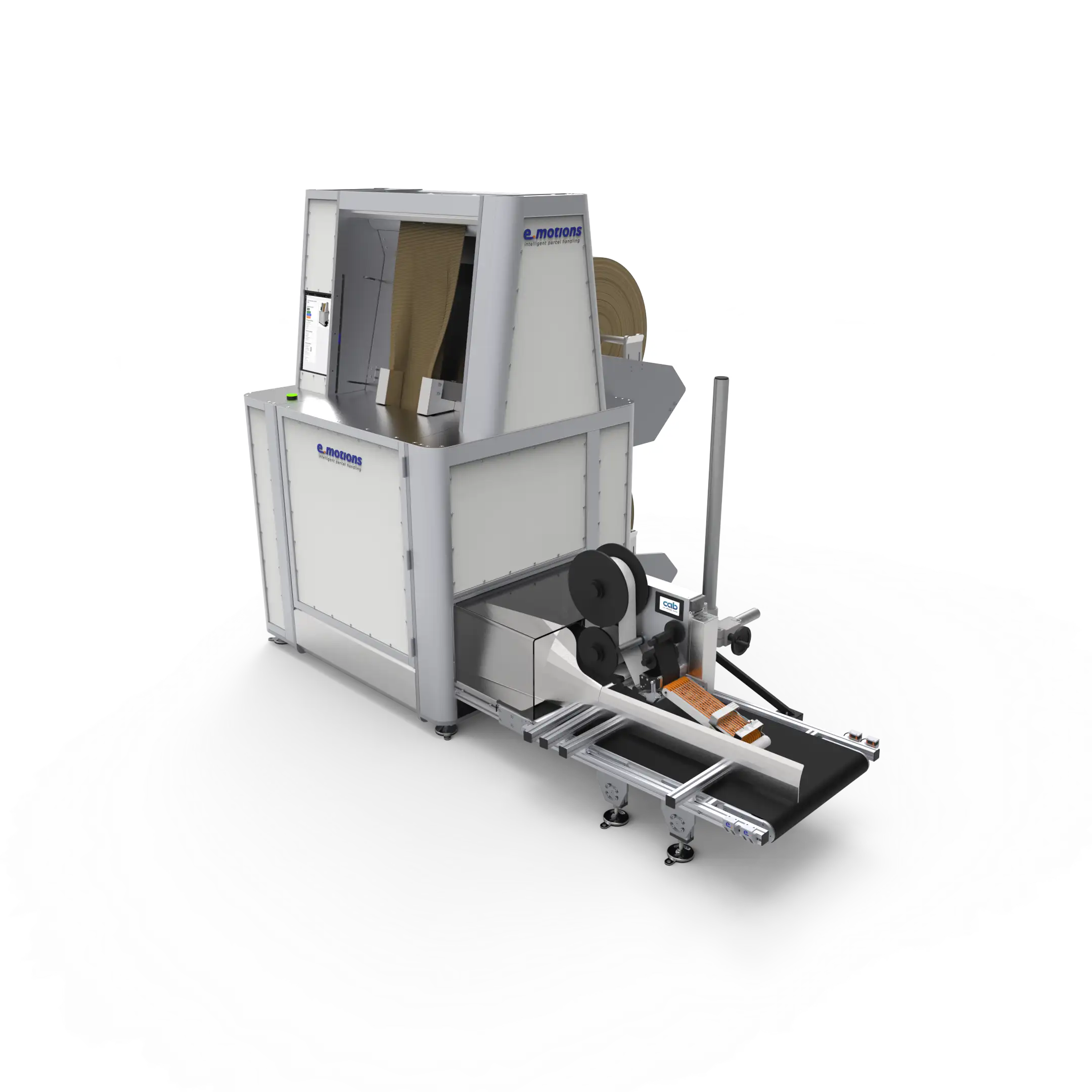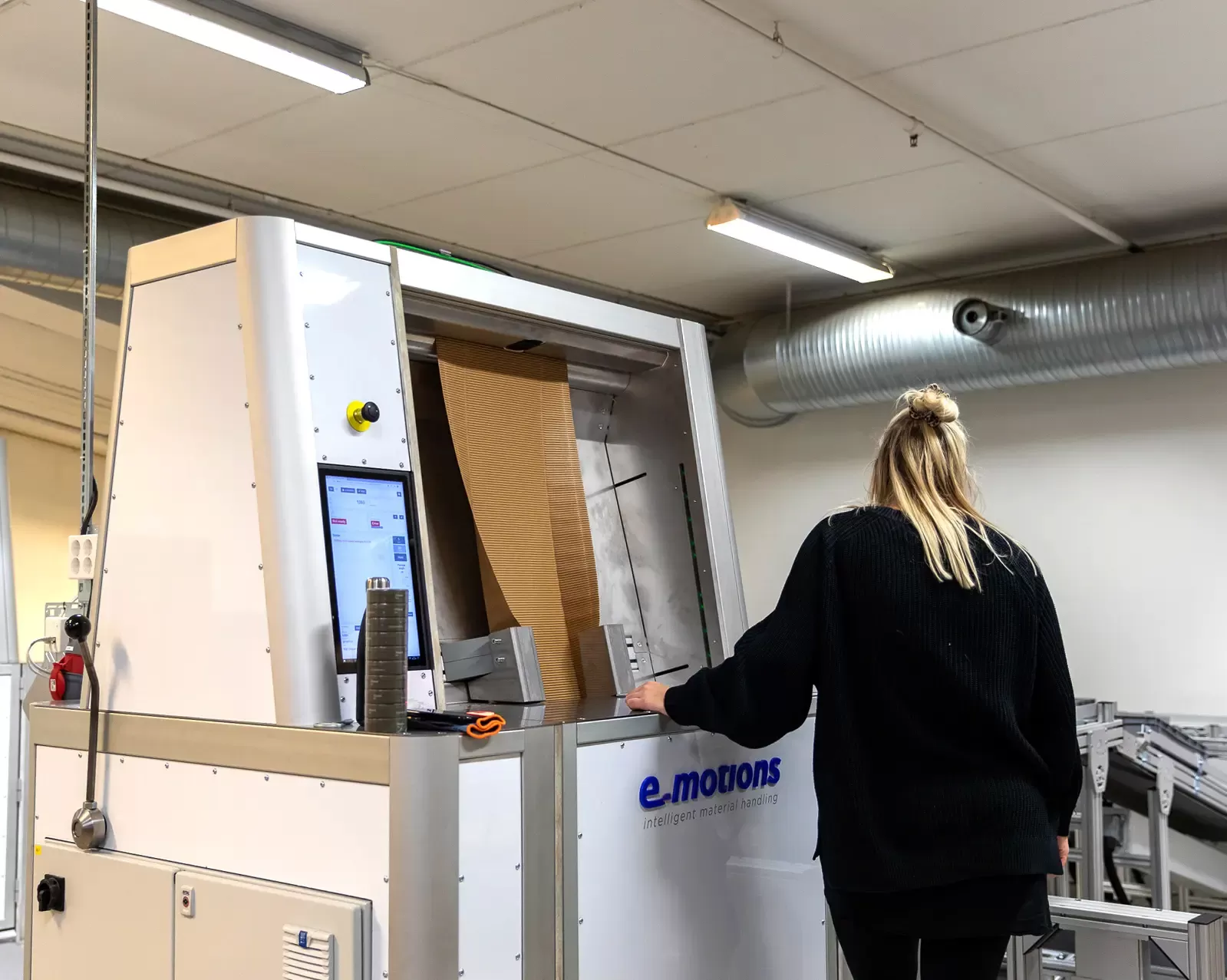


The first real bottleneck you run into as a successful e-retailer, or third-party logistician, is the package. Therefore, this is the perfect starting point in your automation journey. Over time, it is difficult for a manual packer to produce more than 50 packages/h. A packing machine, on the other hand, can produce anything from a few hundred up to thousands per hour
Regardless of which packing machine you consider best for your own business, e motions are always on hand to install and integrate them all.

A packing machine is an innovation that automatically seals the package containing your order.
A manual packing process using staff usually consists of the following steps:
Select the appropriate type of packaging
Select the appropriate size of the chosen packaging type
Set up the box for packaging (worst case scenario)
Control scan each item
Place the items in the box
Add filling material to make sure the goods arrive undamaged
Seal/tape the box together
Print the shipping label and secure it on top of the box
Place the package in the correct parcel cage (if automatic sorting is not included in the process).
The whole purpose of a packing machine is to eliminate as many of the above steps as possible in order to become more efficient. Packing machines are now available in a various range of designs and they can also be interfaced with robots.

Yes, there are! There are plenty of various machines and machine suppliers available for e-commerce. The first thing to distinguish is whether the goods should be sent in a plastic bag or some kind of fibre-based solution (i.e., cardboard), and whether you prefer a fully automatic or semi-automatic solution.
A semi-automatic solution requires a physical operator present to sign off each pack, i.e., via a button. A fully automatic solution doesn’t require a physical operator at all.
The e-motions Coldseal packaging machine is a great entry-level model that is perfect for those who want to take the first step towards automated packaging. This mechanical and electrical machine requires minimal maintenance or staff with mechanical expertise and takes up very little space. It works well as a "stand-alone" solution or as part of a larger system.
Benefits of entry-level machines (semi-automatic)
Investment in relation to efficiency (Max capacity: 600 packages/hour)
Never uses more material than necessary
Available in branded material
Automatic shipping label application
Works extremely well with a product range in reasonably similar dimensions
Another common automated packaging solution is a tray erecting and optimising machine. In short, it is a single machine (tray erector) that is used to erect cardboard boxes. These can be glued as well as taped across the bottom.
Shortly after the box has been erected, it receives an ID-number via an external printer. This ID, aka "bar code", is used to link the order to the box.
The box can then be sent out on a larger conveyor system to end up in a specific slot at a packing table. Or, if a larger conveyor system does not exist, the operator can pick up the box at the time of picking.
When the goods have been placed in the box, the bar code is scanned and the box is optimised. The bar code information controls the chosen type of lid, on-demand printing (logo) and the correct shipping label to correctly send the package to its final destination.
Benefits of Erecting and optimising
Proven concept with few "touchpoints" (where the operator touches the goods)
High capacity of up to 900 packages/hour
Possibility to use various types of lids in the same machine
Disadvantages of Erecting and optimising
Set to the erected box footprint, i.e., the bottom measurement. An erector can generally only erect boxes of one size. To erect a box of a different size, you need another erector.
Erecting and optimisation requires two printers and connected conveyor systems, which can send the cost spiralling. Very few e-retailers use only one or two sizes, which means you often need to invest in several sets of the same machines.
The third and final type of packaging machine is in a class of its own – but you may need to deep-dive into your savings. A pack-on-demand machine uses fanfold (continuous sheets of cardboard that has been scored and folded like a fan) bought in bulk and used to cut boxes to content size.
The machine will measure the contents and build the packaging accordingly, regardless of what product(s) you put into the machine. Whether it's a pair of shoes, a perfume bottle or a food processor, the finished package will always come out fully optimised according to the content.
Advantages of Pack-on-demand (fully automatic)
Minimal air in each shipment
From 5–13 packages/minute (depending on size)
Almost no need for packing staff
Disadvantages of Pack-on-demand (fully automated)
Large investment
Requires automation technicians present at all times
No back-up plan. If the machine stops, everything stops.
Space consuming
Increased packaging waste
Bagging machines are a proven concept with a high capacity (pack/hour) that are highly reliable and require a relatively low investment. But this type of machine may become more problematic, as the world tries to minimise the use of plastic and customer awareness grows. Also, the sourcing of the raw material is becoming less and less attractive to produce due to political pressure. However, this type of machinery is still very common in the fashion segment of e-commerce.
The size of investment | ROI
Automation requires a new level of investment, with amounts and worries that can make even the most thick-skinned person lose sleep at night. e-motion's Cole Seal machine is perfect for beginners, with leasing arrangements close to 60% less the monthly cost of an operator. The machine could potentially also replace 3–6 of your manual packing staff, which means your ROI rarely exceeds 12 months.
Packaging consumption | Environmental aspect
Coldseal itself is a cellulose-based solution that can directly replace the use of plastic in e-commerce. In addition to the environmental aspect, this is the only machine that will use the exact amount of packaging required, compared to i.e., Erection and optimisation, where the same amount of packaging will be used, regardless of whether the box is optimised or not.
This is also true for the pack-on-demand solution, where each box made by the machine has a large amount of packaging waste.
By making sure you only use the minimum packaging required for each order, you can see a big difference in your wallet every month. E-motion’s Coldseal packaging machine also features a camera that ensures that packaging stays true to the contents and never exceeds the content-size, amongst other things.
WMS integration
A major gap for many other machine suppliers is the ability to communicate with the organisation's WMS, which is the heart of the entire warehouse operation.
e-motion's Coldseal packaging machine is built and designed to directly communicate with the WMS, making integration and installation as quick as possible. In addition, through the master data and WMS connection, the machine can give the operator suggestions on how to place the goods in the packaging machine to make the smallest possible package.
Are you interested to know how a packing machine can improve your logistics? Call or email Jeff.
